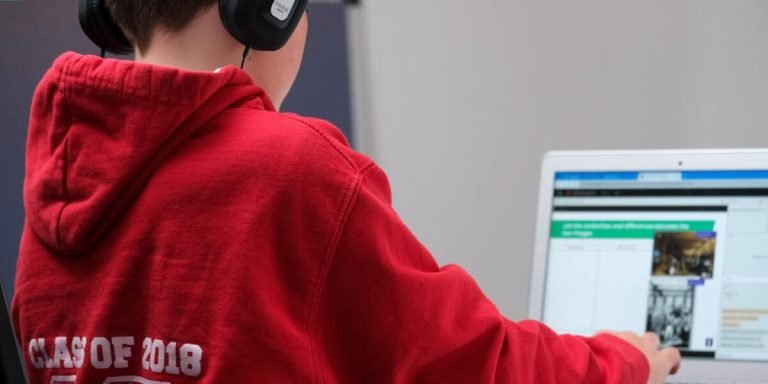Year 7: Transitioning into Adolescence and the Role of Education
Transitioning into “Year 7” marks a significant milestone in a child’s educational journey, signaling the shift from primary to middle school education. With it comes new challenges and opportunities as children take their first steps towards adolescence. The changes are not only physical but also social, emotional and importantly – academic.
The role of education during this critical year is paramount. It serves as an anchor point helping youngsters navigate through these overwhelming shifts while ensuring continuous intellectual growth and development both inside and outside the classroom walls.
Did you know?
Adolescents typically experience a growth spurt that follows these patterns:
- For females, the peak rate of height increase occurs at about age 12.
- For males, this peak happens around age 14.
This physical transformation often coincides with educational level Year 7, making it crucial to address their changing educational needs.
Understanding Year 7 Curriculum: Core Subjects and Electives
The transition to Year 7 marks a significant milestone in a child’s education journey. This year, students are introduced to an expanded curriculum that offers both core subjects and electives, allowing them the opportunity for more focused learning based on their interests and skills. Technology integration into this phase is important because it taps into today’s tech-savvy generation while encouraging better understanding during class interactions.
In 2023, technology has become an integral part of the Year 7 curriculums around the world. Core subjects such as Mathematics, English Language Arts, Science and Social Studies now incorporate digital tools like multimedia presentations or virtual reality simulations to enhance lessons delivery thereby making complex concepts easier for children of this age group to understand.
- Arts courses, such as visual art or music
- Physical education
- Languages other than English (LOTE)
- Career-based learning opportunities
Modern technological advancements have significantly improved student engagement levels compared to previous years. Regardless of their chosen electives—whether film studies with video editing software or language classes through interactive online platforms—students will likely discover how these technologies play vital roles in transformative educational experiences that help shape their future success.
The Role of Standardized Testing in Year 7 Education
Standardized testing plays a significant role in Year 7 education, providing educators with valuable insights into how well students are grasping the core subjects and electives. Knowing this helps inform subsequent teaching strategies. It’s also an opportunity to gauge the general performance of pupils within their specific cohort.
One cannot overlook these tests’ importance since they help measure knowledge gained over time. In year 7, learners progress beyond foundational concepts, delving deeper into specialized areas such as advanced maths or foreign languages. Standardized testing aids in assessing where each student stands with regard to comprehension levels in these diverse topics.
However, standardized assessments don’t solely focus on academic proficiency alone but also cater for technological integration within middle school curricula – something that’s been increasingly embraced over recent years given its burgeoning relevance in modern-day life and future career paths.
Consequently it is crucial all stakeholders involved – be it parents/guardians; teachers; policymakers alike understand implications standardized evaluation could have upon adolescents’ education pathways including potential advantages plus any downfalls associated therewith ensuring full preparation ahead formal test-taking scenarios.
Customizing the Learning Experience with Elective Courses
In the quest to provide a balanced and comprehensive education, many middle schools offer elective courses tailored to enhance your child’s Year 7 learning experience. These electives allow students to delve deeper into their interests while providing an avenue for them to develop new skills that may not be covered in core curriculum subjects.
Understanding how these elective courses can enrich your child’s educational journey is essential. They bring diversity into the traditional classroom setting, offering opportunities for personalized learning based on individual student needs and preferences.
One significant aspect of modern-day education we cannot overlook is technology integration – it has become increasingly important in Year 7 classrooms worldwide. Elective courses today often incorporate various technological elements aimed at preparing students for our rapidly evolving digital world.
Courses such as Computer Science or Digital Literacy have substantial value; they equip learners with essential skills like coding programming languages, understanding hardware-software interactions and even online safety norms—skills vital in this era of technology dominance.
By choosing year seven electives that prioritize tech-integration, parents aid their children’s transition from consumers of technology towards becoming creators who understand its workings inside out! This lays groundworks ensuring long-term success irrespective of future careers chosen by these young minds!
Challenges and Strategies for Transitioning into Middle School
As children make the significant leap from elementary school to middle school, they encounter an array of changes that can sometimes seem overwhelming. The transition into Year 7 heralds a new era in their educational journey where independent learning becomes more prominent and peer pressure often intensifies. One of the main challenges many students face during this period is adapting to a different academic structure infused with technology.
The integration of technology in education has universally transformed teaching methods and learners’ experiences worldwide by opening up numerous avenues for interactive learning. However, successful implementation depends profoundly on understanding both its advantages and potential pitfalls.
To ease pupils into leveraging technological resources effectively within their studies, educators must deploy strategic efforts tailored towards each pupil’s unique needs at this stage. This strategy could involve offering training sessions or workshops focusing on various online tools such as educational apps or digital textbooks relevant to year 7 curriculum content.
Moreover, teachers need keen collaboration mechanisms amongst themselves for sharing insights about best practices around tech utilization within classroom settings. They also have a responsibility to ensure that these technologies are available equally among all students irrespective of social-economic backgrounds—a step crucial not just as an act against discrimination but also instrumental for fostering inclusivity via technological literacy advancement.
By addressing these key concerns head-on—whether it’s through individualized support systems or creative strategies like mentoring programs—schools can give students transitioning into year 7 the confidence needed while navigating Middle School Education landscapes shaped vastly by ever-evolving technologies.
Overcoming Academic Hurdles in the First Year of Middle School
Transitioning from elementary to middle school is a significant milestone in every student’s life. This transition often brings with it specific academic challenges, especially during the first year – typically referred to as ‘year 7’. Therefore, having strategies aimed at overcoming these hurdles can greatly help students navigate this critical phase of their education life.
One common challenge that Year 7 students face revolves around coping with increased workload and greater expectations for independence. They’re now expected to manage multiple subjects and teacher preferences while also keeping track of assignments’ due dates all by themselves. A great strategy here could be teaching kids how to use digital tools such as Google Calendar or similar apps which are designed specifically for adolescents.
Social Adaptation: Navigating New Peer Dynamics
Year 7 is a critical transitional phase in any child’s educational journey, especially as they move on towards middle school. The social atmosphere notably shifts during this period and children must learn to navigate new peer dynamics.
One of the essential aspects that year 7 students confront at this stage is their adaptation into larger social circles compared to primary schools. They are now exposed to numerous peers from various cultural, demographic or socioeconomic backgrounds – presenting an excellent opportunity for personal growth but also attractive challenges.
For instance, there could be moments when they find themselves unsure about how to fit in or interact with diverse personalities effectively within these groups. This uncertainty may sometimes lead them feeling out of place and causing anxiety.
Technology has proven immensely useful in helping Year 7 pupils smoothly navigate changes under the broad scope of “Technology Integration in Education”. For example:
1) Online Social Platforms: These platforms provide safe spaces where youngsters can engage constructively with classmates outside typical class hours; Cementing relationships while working together on collaborative projects digitally.
2) Games-Based Learning: Reputable learning software utilizes gaming principles such as teamwork and competition which help foster better interpersonal relations among students whilst simultaneously maintaining engagement levels high throughout study sessions.
Enhancing Student Engagement through Extracurricular Activities
Utilizing extracurricular activities to boost student engagement has become an integral part of middle school education, especially in the pivotal year 7. Academics alone cannot foster a well-rounded development; hence these ‘extras’ play a crucial role in shaping students’ skills and personalities. Extracurriculars are designed not only for recreation but also to infuse social skills and leadership qualities amongst young learners.
In this era where technology plays such an immense role across all spheres of life, its integration into education is fundamental. With emerging innovations that capture the imagination of Year 7 pupils, it’s essential to make smart use of tech within their learning scenarios. The incorporation can range from coding clubs which sparks logical thinking among children or digital art classes that help enhance creative flair while imparting valuable technical knowledge.
Moreover, linking technologically driven extra-curricular activities with academic concepts further piques interest leading to greater participation and understanding. It aids them in applying theoretical concepts practically thereby ensuring deeper comprehension along with fun-filled learning experiences.
The delightful blend between technological advancements like virtual reality field trips or online debate platforms seamlessly marries traditional classroom teachings with modern methods oftentimes resulting in enhanced intellectual curiosity – creating positive ripple effects on overall scholastic achievement particularly at this critical juncture around Year 7 schooling time frame when students gradually transition towards higher secondary grades.
Balancing Academics with Sports, Arts, and Clubs
Fostering a sense of balance between academics and extracurricular activities such as sports, arts, and clubs is crucial in enhancing student engagement especially at the Year 7 level. Middle school education plays an essential part in preparing students for high school and beyond; integration of technology makes it even more effective.
Sports provide opportunities for children to boost their physical fitness, develop team spirit, nurture leadership qualities while also having fun which can significantly enrich their educational journey. In our digital age where most adolescents are glued to screens for long hours each day, encouraging them to participate actively in sports can prove beneficial towards promoting overall well-being.
Arts facilitate mental growth by fostering creativity among youngsters. For many year 7 pupils who might not excel academically but have extraordinary artistic skills – be that in art & craft or music & drama – getting involved with these disciplines provides an outlet through which they can externalize emotions leading to better emotional health.
Similarly participating within various types of clubs broadens horizons about different knowledge domains early on providing varied learning experiences outside traditional academic boundaries. It assists young learners discover personal interests beyond textbooks hence augmenting student engagement levels substantially during middle schooling years- the foundation stone lays groundwork higher grade studies later on .
Today’s world necessitates leveraging technology effectively across every aspect life including education . Incorporating tech-driven tools teaching methodologies has revolutionized way we impart lessons today compared previous generations ; simultaneously proven tremendously helpful facilitating seamless transition remote leaning during pandemic situation recent times .
Cultivating Leadership Skills Outside the Classroom
In our digital age, it is imperative to instill leadership skills in our young learners as early as possible. One of the most effective ways to do this, especially for students in year 7 and middle school education, is through participation in extracurricular activities.
Extracurricular platforms can provide an excellent avenue for incorporating technology integration into education. Encouraging children to leverage advanced tools like programming kits or digital art software not only teaches them about modern tech but also develops their decision-making abilities.
Drama clubs are fantastic settings where kids can role-play various scenarios that require quick thinking and strategizing – essential traits of a leader. Moreover, these environments typically allow more freedom than classroom settings providing ample opportunities for innovation using multimedia presentations or virtual reality setups.
Participation in team sports both physical and digital have always been known to foster cooperation among peers – a critical aspect of leadership development. Online multiplayer gaming provides similar benefits while familiarizing youngsters with interactive technologies too!
Finally, community service efforts promote empathy – another crucial characteristic leaders must possess; whether organizing online campaigns or leveraging social media for awareness drives proves beneficial here!
Conclusion
In effortlessly navigating the choppy waters of Year 7 and adolescence, knowledge truly becomes a beacon. From hormonal changes to complex algebra problems, it’s an age where children break free from their chrysalises and come into their own individually. As educators or supportive parents in this journey, we can foster resilience today for a world-ready generation tomorrow.
Got questions about supporting your growing child through education? Curious about building emotional intelligence while keeping academics intact? Explore our website further!
A treasure trove of resources awaits you here as every bit helps when shaping the future leaders, innovators and thinkers. Remember – When it comes to empowering childhoods with education – you’re never alone on this rewarding path.







